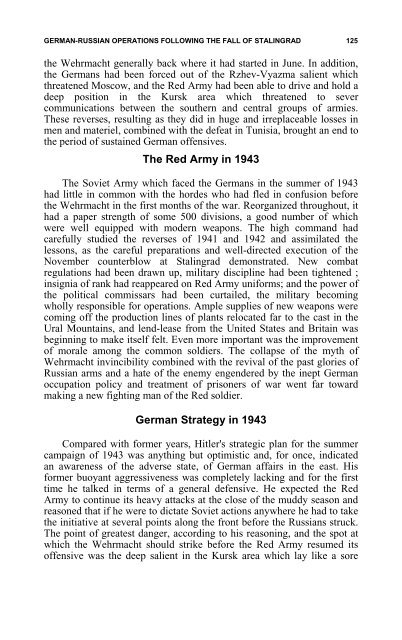the soviet partisan movement 1941-1944 by edgar m. howell
the soviet partisan movement 1941-1944 by edgar m. howell
the soviet partisan movement 1941-1944 by edgar m. howell
Create successful ePaper yourself
Turn your PDF publications into a flip-book with our unique Google optimized e-Paper software.
GERMAN-RUSSIAN OPERATIONS FOLLOWING THE FALL OF STALINGRAD<br />
125<br />
<strong>the</strong> Wehrmacht generally back where it had started in June. In addition,<br />
<strong>the</strong> Germans had been forced out of <strong>the</strong> Rzhev-Vyazma salient which<br />
threatened Moscow, and <strong>the</strong> Red Army had been able to drive and hold a<br />
deep position in <strong>the</strong> Kursk area which threatened to sever<br />
communications between <strong>the</strong> sou<strong>the</strong>rn and central groups of armies.<br />
These reverses, resulting as <strong>the</strong>y did in huge and irreplaceable losses in<br />
men and materiel, combined with <strong>the</strong> defeat in Tunisia, brought an end to<br />
<strong>the</strong> period of sustained German offensives.<br />
The Red Army in 1943<br />
The Soviet Army which faced <strong>the</strong> Germans in <strong>the</strong> summer of 1943<br />
had little in common with <strong>the</strong> hordes who had fled in confusion before<br />
<strong>the</strong> Wehrmacht in <strong>the</strong> first months of <strong>the</strong> war. Reorganized throughout, it<br />
had a paper strength of some 500 divisions, a good number of which<br />
were well equipped with modern weapons. The high command had<br />
carefully studied <strong>the</strong> reverses of <strong>1941</strong> and 1942 and assimilated <strong>the</strong><br />
lessons, as <strong>the</strong> careful preparations and well-directed execution of <strong>the</strong><br />
November counterblow at Stalingrad demonstrated. New combat<br />
regulations had been drawn up, military discipline had been tightened ;<br />
insignia of rank had reappeared on Red Army uniforms; and <strong>the</strong> power of<br />
<strong>the</strong> political commissars had been curtailed, <strong>the</strong> military becoming<br />
wholly responsible for operations. Ample supplies of new weapons were<br />
coming off <strong>the</strong> production lines of plants relocated far to <strong>the</strong> cast in <strong>the</strong><br />
Ural Mountains, and lend-lease from <strong>the</strong> United States and Britain was<br />
beginning to make itself felt. Even more important was <strong>the</strong> improvement<br />
of morale among <strong>the</strong> common soldiers. The collapse of <strong>the</strong> myth of<br />
Wehrmacht invincibility combined with <strong>the</strong> revival of <strong>the</strong> past glories of<br />
Russian arms and a hate of <strong>the</strong> enemy engendered <strong>by</strong> <strong>the</strong> inept German<br />
occupation policy and treatment of prisoners of war went far toward<br />
making a new fighting man of <strong>the</strong> Red soldier.<br />
German Strategy in 1943<br />
Compared with former years, Hitler's strategic plan for <strong>the</strong> summer<br />
campaign of 1943 was anything but optimistic and, for once, indicated<br />
an awareness of <strong>the</strong> adverse state, of German affairs in <strong>the</strong> east. His<br />
former buoyant aggressiveness was completely lacking and for <strong>the</strong> first<br />
time he talked in terms of a general defensive. He expected <strong>the</strong> Red<br />
Army to continue its heavy attacks at <strong>the</strong> close of <strong>the</strong> muddy season and<br />
reasoned that if he were to dictate Soviet actions anywhere he had to take<br />
<strong>the</strong> initiative at several points along <strong>the</strong> front before <strong>the</strong> Russians struck.<br />
The point of greatest danger, according to his reasoning, and <strong>the</strong> spot at<br />
which <strong>the</strong> Wehrmacht should strike before <strong>the</strong> Red Army resumed its<br />
offensive was <strong>the</strong> deep salient in <strong>the</strong> Kursk area which lay like a sore
















